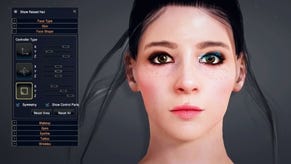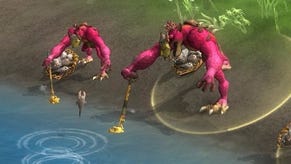GC: Spore
New details of Will Wright's latest.
Not long into our 30-minute demo of Spore, there's a knock on the door. A PR's head appears. "We need to limit the demos to 20 minutes," she says. There's a pause. One of the men demoing the game quietly replies, "Yeah. We can't do that."
Clearly, there's a lot to say about Spore. Some of which you'll already know: it's the brainchild of Sims creator Will Wright, it's about evolving single cell organisms into creatures and then civilisations, and it will let players populate each others' worlds with their creations.
You've probably also heard it's been delayed (release is now set for spring next year). And you might have wondered whether Spore would ever manage to fight its way past all the quantum physics and theories of game design in Will Wright's head to actually make it onto the shelves.
The answer is yes. We're being shown a full build of Spore, and told that right now, "You can play through the entire game from the very beginning to the very end." But seeing as we've only got 30 minutes, and even that's under threat, today's demo will focus on two sections.
On the make
First up is the Creature level, which would normally follow the single cell bit and begins with character creation. The interface for the Creature Editor looks simple and intuitive, and it's easy to see how you could spend hours playing with it.
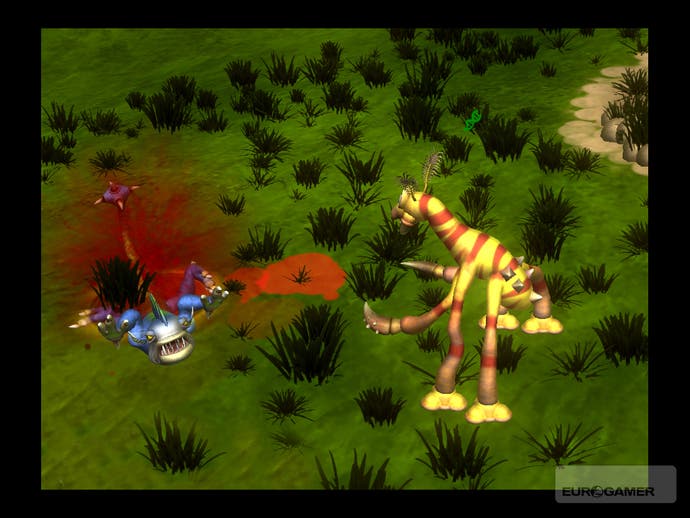
Although you've got a finite selection of arms, legs, mouths and so on, there are plenty of choices to make. There are things like spines and horns to stick on, skin colours to choose from, patterns to add. You can manipulate your Creature's body as if it was a piece of clay, change the size of their hands, make their elbows stick out or increase the gap between their toes... So while it looks as easy as making a Mii, the end result will be essentially unique.
Once your Creature is complete you can plonk him into a 3D world. The one we're being shown today features rolling hills and giant mushrooms, but of course others will differ; volcanic and gaseous planets are mentioned, and there's confirmation you can terraform planets.
The environment is lush, bright and simple, with plenty of open space. It's populated by wild animals, which you can eat, and other Creatures with whom you can make friends, fight or mate. Or a combination, just like real life. If you're playing online these will include Creatures designed by other players, but there are also plenty of NPCs for people frightened of the Internet.
This part of the game has a simple Sims-style mechanic. You've got to make sure your Creature, or Creatures once the mating starts, has enough to eat and drink, for example. You can make them attack other species, earning an 'aggressive' rating, or sing and dance instead to be 'social'.
Tribal warfare
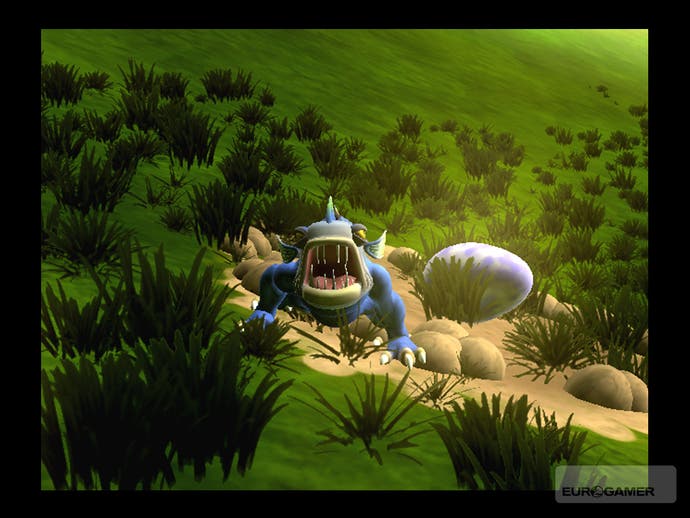
Apparently the Creature level will take you about an hour and a half to complete. It ends when your Creatures discover fire, at which point they become a Tribe. This level is described as a "light RTS style game". You can order your Creatures about as you would troops, getting them to forage for fruit or hunt wild animals.
This gets you food units which can be used as currency. Things to buy include fishing rods, clubs, axes and spears, plus basic buildings like a mating hut and healing tent. You'll also need a recruiting tool so you can attract new members to the Tribe. If it doesn't work, you can force other Creatures to join you by attacking their Tribe.
Once again, it all seems simple and intuitive. It's hard to tell just by watching someone else play the game, but it doesn't look like you'll be punished too hard for pursuing strategies that don't work. This isn't a fully-fledged RTS offering a serious challenge; it's more about letting you explore, play and experiment with the different options available to find out what works.
High concept
Which is also the idea of Spore as a whole. Will Wright has previously stated, "The most interesting stories I hear from gamers are the stories they tell me about what they did in the game. Where that comes in Spore is letting the players fully own the characters, because they created them."
It's a bit disappointing that today's demo hasn't really conveyed this concept. The Creature and Tribe levels look fun, and there's clearly huge scope for creativity with the Creature Editor. But it's the other elements which will make Spore really special.
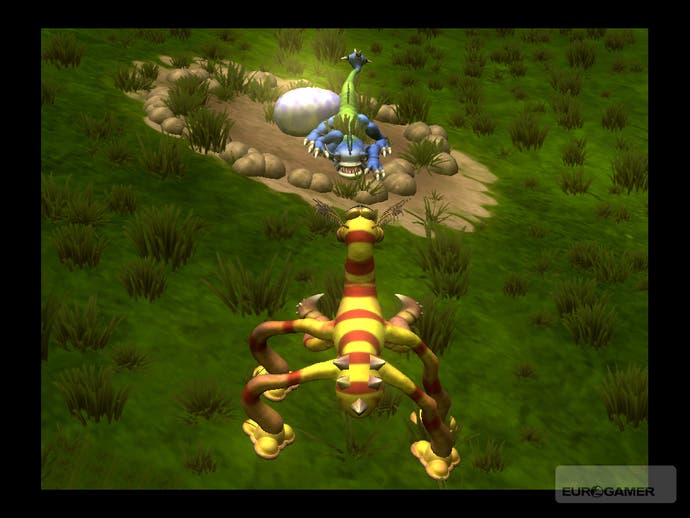
We are given a tantalising glimpse of one. On screen is what you'll see when you've completed the Creature and Tribe levels and finished building your Civilisation. It's a galaxy of stars, hundreds of pinpricks of twinkling light. We're told that each star is actually a planet you can visit. Each of them is different. Each of them is home to different species. And each of them is populated by species created not only by game designers, but other players.
In all honesty, this single screen is the most exciting thing we've seen during the demo. Wright has talked about how Spore will involve exploring other worlds since the beginning, but looking at the stars gives you a real sense of the possibilities.
We can't help but wish we'd spent the last 30 minutes learning more about this part of the game. But at least what we did see of Spore looks good, and at least the finished game isn't too far, far away.


